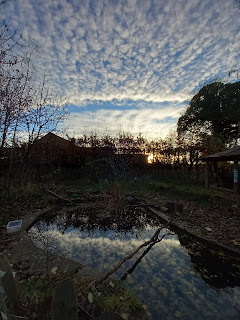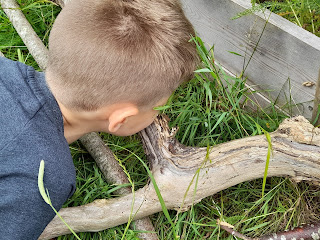Summer Terms & Conditions
When I worked in London immediately after Easter came Summer Term.Term 3. In two halves.
Now I work within Kent and this is the dawn of terms five and six. It's the same time period, it's the same season, and it's the same chaos across all education.
If you work in a school your year is divided into six no matter what. You are technically at work nine months of the year, but you squeeze in twelve months of work during that time! Summer Term(s) feel the easiest. You've had your class for two-thirds of the school year and you've all got to know each other and the routine. no longer does the commute to school and the drag home happen in darkness. Everyone and everything seems more cheerful. Somehow, in our perspective, this overshadows the end of year reports, school journeys, SATs, pending staff changes, school fetes, sports days, parent evenings, leaver's concerts, parties, and the emotions of year six children getting ready to move on...
Forest School remains constant.
A weekly session per class and a celebration at the end of each term. The season changes. The environment looks different. Activities alter. But we all still start at basecamp, explore at will, and return to basecamp. And eagerly await marshmallows and a campfire at the end of term! This routine, this grounding, is part of the power of Forest School. The children know what to expect, it's a safe and secure constant throughout. It was the only 'unchanged' thing in lockdown, a continual thing during the entirety of the covid chaos of 2020/2021.
For adults, things are going to change a bit. We are hosting Forest School training, during which we will train two more school staff to be FS Leaders, and that opens up a lot of possibilities. We hope to expand our Outdoor Learning in terms of what we provide and who we provide it to.
Meanwhile, Forest School will continue for all classes.
It will be a juggling act coordinating participation in tutoring staff, accomodating study, and maintaining a status quo for the children.
I'm not sure light evenings and warmer weather will ease the hectic pace of Summer Terms about to commence.
Outside of our basecamp, there is change afoot elsewhere. After a long campaign Secondary Schools are aiming to introduce a Natural History GCSE.
This is a positive move towards helping children understand the world they will face as adults in terms of the threats to the natural world and the condition of the planet as a whole.
We cannot futureproof the world for them, too many grown-ups are causing the issues they face, but finally, we are beginning to think about giving them some tools and information to use in the future. They will have to devise an assortment of actions and solutions as they continue through adulthood.
The need to connect to nature, and LEARN about the natural world around us has never been greater.
The means to TEACH it is just finding its feet. As of yet, it is not clear if Natural History will be its own subject or crowbarred into the science curriculum, the new responsibility of a secondary school department that currently runs with no spaces or staff to do more.
There is the possibility that the subject will end up compulsory, as the need to find more and more ways and means to improve the conditions humans live in.
There is the possibility that the subject will trickle down into Primary Education, in the way what was once Year 7 maths is now in Year 5, and how the very basics of French became the remit of Key Stage 1.
There is the pending issue of finding spaces for practical activities in schools which have sold off their playing fields, schools in concrete environments, and schools with very few green spaces nearby to utilise.
There is a pending gap which Forest Schools can help bridge, and can offer space and expertise to support secondary schools' transition into GCSE mode.
Primary Schools can also start to lay the foundations for this learning by providing sessions for their pupils so that they have some foundation knowledge before they even reach Secondary School.
It has taken a very long time for children's education to begin to focus how to care for the planet. How to connect to nature. How to recognise and identify wildlife. How to find the best ways to heal and nurture the place we all live.
Now there is an extra reason, on top of health and wellbeing, self-esteem and motivation, understanding and belonging, to ensure as many children as possible experience Forest School.
So I'm not expecting it to get less hectic or busy once Summer Terms have finished.There is a lot to contemplate.
There are a lot of possibilities.
There is much to come.
infographics from Curlew Action on Facebook










Comments
Post a Comment